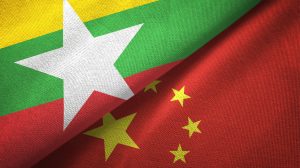The head of Myanmar’s military junta embarked yesterday on an official visit to China for regional meetings, his first trip to the country since the coup of February 2021.
Myanmar state media reported that Senior Gen. Min Aung Hlaing will attend summits of the Greater Mekong Subregion and the Ayeyarwady-Chao Phraya-Mekong Economic Cooperation Strategy during the two-day state visit. He will also join a meeting with counterparts from Cambodia, Laos, and Vietnam.
State television station MRTV stated that Min Aung Hlaing will also have “meetings with Chinese government officials to discuss ways to enhance goodwill, economic and various sectors between the two governments and the people.”
Min Aung Hlaing’s trip to Myanmar was reported widely last month, but only confirmed by the two sides earlier this week. During the visit, The Irrawaddy reported on October 15, Min Aung Hlaing may meet with Chinese Premier Li Qiang. It said that the two sides would “discuss the regime’s forthcoming election, which is scheduled to be held in 2025, among other things.”
In line with previous visits of senior junta personnel, Min Aung Hlaing has been invited to attend a multilateral summit rather than being hosted with bilateral pomp in Beijing. Nonetheless, while maintaining diplomatic links with the SAC, it has so far held back from rolling out the red carpet for the man most responsible for the coup and the destabilizing and destructive conflict that has ensued. The general’s state visit appears to mark a pivot toward greater support for the State Administration Council (SAC), as the junta terms itself.
In a statement posted on Facebook, Kyaw Zaw, a spokesperson for the opposition National Unity Government (NUG) said that he was deeply concerned about China’s invitation to Min Aung Hlaing.
“Myanmar’s people want stability, peace and economic growth. It is Min Aung Hlaing and his group who are destroying these things,” Kyaw Zaw said, according to the Associated Press. “I am concerned that it will unintentionally incite a misunderstanding of the Chinese government among Myanmar’s public.”
In a statement, the advocacy group Defend Democracy Myanmar said that the visit “reinforces existing indications that Beijing is developing closer ties with the military junta,” but said that it would undermine the friendly “pauk-phaw” ties that have existed between the countries. “Any benefits China could gain from its support for the criminal military junta seem to be outweighed by risks,” it stated. Last month, days after the news of Ming Aung Hlaing’s trip to China broke, the Chinese consulate in Mandalay, Myanmar’s second-largest city, was reportedly attacked with an explosive device.
Given the intensification of Chinese diplomatic outreach over the past six months, the invitation to Min Aung Hlaing is likely related to the dramatic changes that have taken place over the past year. During that time, the military has lost considerable amounts of ground to ethnic armed groups and allied People’s Defense Forces, particularly in areas close to the Chinese border. The Operation 1027 offensive, which was launched by the Three Brotherhood Alliance of ethnic armed groups in October 2023, has all but expelled the Myanmar armed forces from the northern part of Shan State.
While China is believed to have given its blessing to the first phase of Operation 1027, in which the Alliance promised to shut down online scamming operations in the Kokang region, it has been unsettled by the second phase of the offensive, which began in late June, breaking a China-brokered ceasefire. Phase two of Operation 1027 culminated in the Myanmar National Democratic Alliance Army (MNDAA)’s capture in early August of Lashio, the de facto capital of northern Shan State. This has given resistance forces control of major arteries of trade with China, and brought them a step closer to launching large-scale attacks into Myanmar’s dry central zone.
The military’s losses, which raise the prospect of a full collapse, have seemingly alarmed Beijing, which fears that prolonged instability or political fragmentation could undermine its strategic and business interests in Myanmar.
In recent weeks, Chinese authorities have closed border gates abutting rebel-held regions and used what leverage they have with these groups to bring the fighting to an end. At the same time, suspecting that the NUG and other resistance groups are too close to the West, China has seemingly reoriented its strategy around support for the military’s election plan, which the SAC has long held out as a means of transition to some form of militarized civilian rule. In the first half of October, the regime carried out a pre-election census and said that it plans to hold the elections sometime in 2025.
In this context, inviting Min Aung Hlaing China may be an attempt to exercise a greater influence on the course of the country’s conflict and the electoral transition plan. However, there is every likelihood that this influence will be gained at the cost of alienating the mass of the Myanmar population that opposes the military.

































